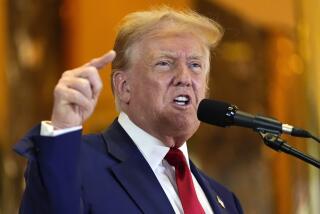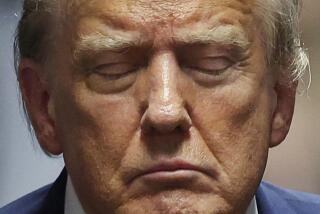Clinton Faces Several Options as Time to Testify Nears
WASHINGTON — As he prepares for his grand jury testimony on Monday, President Clinton appears to have two basic options.
He can flatly deny again that he had a sexual relationship with Monica S. Lewinsky. If that is true, he will surely take this approach, even if it contradicts what the former White House intern has told the grand jury. However, if independent counsel Kenneth W. Starr has evidence to support Lewinsky’s account, he could charge the president with perjury for this statement and report it to Congress as an impeachable offense.
Or, in option No. 2, the president could admit that what Lewinsky says is true and confess in embarrassing--and possibly politically devastating--detail.
As the showdown between the president and prosecutor nears, some of his advisors are talking up a third option, something that falls between a flat denial and a full confession. Assuming the truth of Lewinsky’s story, they are suggesting that Clinton acknowledge he had an inappropriate relationship with her but refuse to reveal sexual details.
The advantage of this middle-ground strategy, they say, is that it could allow the president to avoid what his lawyers now fear most: a charge of lying under oath to a federal grand jury. It would also let the steam out of Starr’s investigation and end the threat of impeachment.
The president “could defuse this very quickly if he acknowledged it in a general way,” said one Clinton legal advisor.
“He could do as he did in the 1992 campaign, when he publicly admitted making mistakes in his relationship with Gennifer Flowers,” said another Clinton aide. “He can say he will talk about questions of perjury or obstruction of justice, things the grand jury is interested in, but won’t answer questions about sex.”
The president’s apparent dilemma has spawned one of the capital’s biggest guessing games in years. No one knows just how Clinton will answer Starr’s questions, but he has received plenty of unsolicited advice.
Publicly, White House aides have said that the president will stick to his earlier denials of any “sexual relationship with that woman, Miss Lewinsky.” And, as recently as Wednesday, a White House spokesman said that Clinton would testify both “completely and truthfully.”
Democrats say they want the president to tell the full truth. If the former White House intern’s story is false, Clinton should strongly and publicly deny a sexual affair. If not, he should forthrightly admit it, they say.
One senior advisor says that the president’s responses are still being debated and nothing is firmly decided.
“I don’t think he knows, and I don’t think his lawyers know yet,” this advisor said when asked how Clinton will respond Monday. The decision will be made over the weekend, he predicted.
The prospects for a veiled, partial admission from Clinton have grown in recent weeks, lawyers say, since Lewinsky has cooperated with Starr and her stained dress has appeared.
Unquestionably, the president faces a difficult dilemma. If he testifies under oath that he did not have sex with Lewinsky, Starr could use her contrary account as a basis for recommending impeachment. If, however, he confesses to a sexual affair, it would be an admission that he lied to the American people and to the lawyers who represent Paula Corbin Jones in her sexual harassment lawsuit against him.
Still, some legal experts think that the president can use his grand jury appearance--and possibly a public statement afterward--to extricate himself from the worst trouble.
Normally, a grand jury witness cannot answer some questions and refuse others. Usually, a witness must either answer fully or invoke the 5th Amendment protection against self-incrimination.
But the president is not a normal witness, and Starr’s inquiry is not a normal proceeding.
As a legal matter, the president is appearing voluntarily before the grand jury. That is a crucial difference, many lawyers say.
Starr’s grand jury served Clinton with a subpoena, but because of the Constitution’s separation-of-powers doctrine, legal experts doubt that a federal judge can compel a president to appear in court. Rather than fight that battle all the way to the Supreme Court, the president and the independent counsel agreed on the arrangement that allows Clinton to testify voluntarily from the White House and Starr withdrew the subpoena.
“This is not the usual grand jury proceeding, and I think the president will use it to answer the questions selectively and give a fuzzy mea culpa,” said Georgetown University law professor Paul Rothstein.
Some have scoffed at this as the “I didn’t inhale” strategy, a reference to candidate Clinton’s famous yes-no response in 1992 to a question about whether he had ever smoked marijuana.
But Rothstein says that a “well, maybe” admission of a personal relationship with Lewinsky would work for Clinton because the public would understand what was being said.
“Most people don’t want to know the dirty details. This will look like he is answering the big questions, while also saying: ‘You have no right to go into these details,’ ” Rothstein said. “He can say: ‘That’s between me and Hillary.’ ”
C. Boyden Gray, President Bush’s White House counsel, agrees and says that the public “would breathe a sigh of relief” if Clinton essentially admitted what most believe to be true.
“He could get out of this mess by acknowledging some sort of relationship, admitting it was a mistake and then saying it would be unseemly to go into details,” Gray said. He and others suggested the president could cite the privacy concerns of his family and Lewinsky as a basis for refusing to reveal intimate details.
To be sure, plenty of former prosecutors and defense lawyers think this strategy of selective answers would not work, even if the president were inclined to follow it.
“I don’t see how it works legally. Unless you cite a privilege, you can’t refuse to answer a question in the grand jury,” said attorney Daniel Rinzel, a former federal prosecutor.
“The danger is the judge can hold him in contempt for refusing to answer,” added attorney Stanley Brand, a fierce critic of Starr’s. “Why not take the 5th Amendment? I don’t see why that’s such a horrendous alternative when you are dealing with an out-of-control prosecutor.”
The presiding federal judge, Norma Holloway Johnson, is not expected to sit in the room during the questioning Monday but will be available if needed. Should Starr be dissatisfied with Clinton’s responses, he could ask the judge to intervene to order the president to answer the questions fully.
At that point, however, Clinton lawyer David E. Kendall could call a halt to the proceeding and say that the White House will challenge an order that compels the president to respond or seeks to hold him in contempt of court.
“This is an untested area under the Constitution, and the president would certainly be within his rights to say we’re going to appeal the judge’s order,” Rothstein said. That could delay matters for weeks and also put Starr in the unenviable spot of fighting in higher courts simply to obtain more detailed answers about a sexual relationship.
The option of admitting an inappropriate relationship with the former intern has several obvious problems, both political and legal.
On Jan. 26, Clinton looked straight into the cameras “to say one thing to the American people: I did not have sexual relations with that woman, Miss Lewinsky.”
It would cause untold damage to his credibility to have to essentially admit that he had lied. On Monday, Clinton also might be forced to disavow his denial in the Jones case that he had “sexual relations” with Lewinsky. Reportedly Clinton had once said that he believes the phrase “sexual relations” means sexual intercourse only. But lawyers for Jones read him a broad definition of the phrase that included virtually all sexual contact of any sort.
Before the grand jury, the president could revise the answer he gave Jones’ lawyers so as to avoid a further perjury charge. If so, however, Jones’ lawyers probably would cite the comment as further reason for reopening their lawsuit.
The president “has put himself into a terribly difficult position,” attorney Rinzel said. “But he is a clever, smart and slippery guy, and if there’s anyone who can talk his way out of it, it’s probably him.”
Chief Washington correspondent Jack Nelson contributed to this story.
Updated coverage leading to President Clinton’s video testimony and a discussion on the Monica S. Lewinsky matter are on The Times’ Web site. Go to: http://161.35.110.226/scandal
More to Read
Get the L.A. Times Politics newsletter
Deeply reported insights into legislation, politics and policy from Sacramento, Washington and beyond. In your inbox three times per week.
You may occasionally receive promotional content from the Los Angeles Times.











